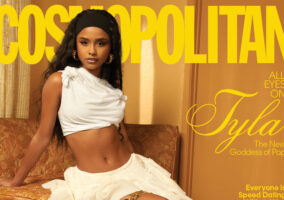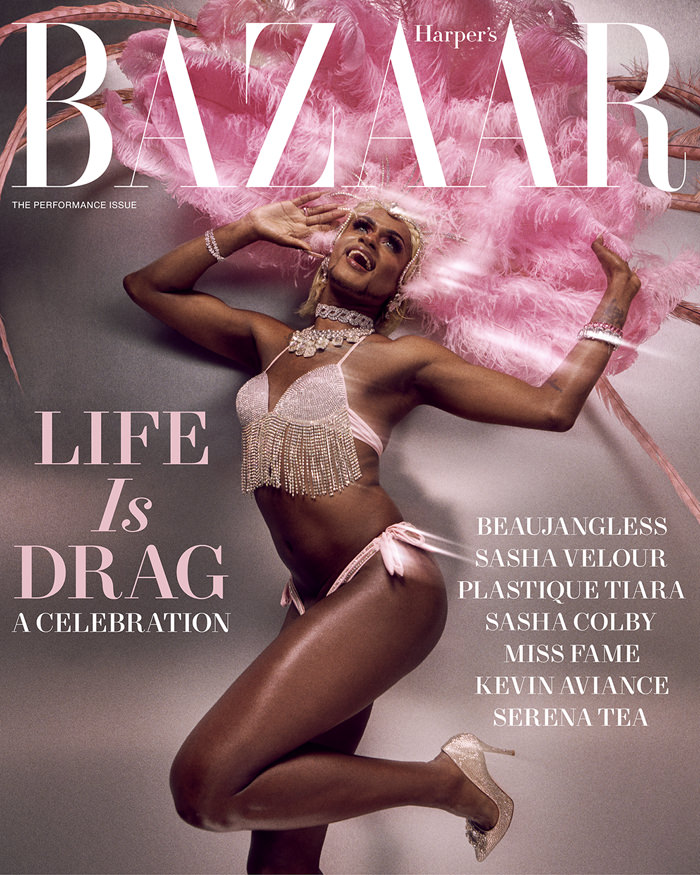
Seven drag queens including Beaujangless, Sasha Velour, Kevin Aviance, Plastique Tiara, Sasha Colby, Miss Fame, and Serena Tea talk gender, power, and the joy of performance.
Around the country, drag performers are under threat, thrust to the center of a culture war. But for practitioners of the art, it’s not just about putting on a show; it’s about finding truth, community,
and freedom.
For BAZAAR’s July digital cover story, Alexander Chee explores the ways in which drag has always been a part of our culture and what’s at stake when gender expression is demonized, politized or criminalized.
Beaujanglesss
As told to Ariana Marsh
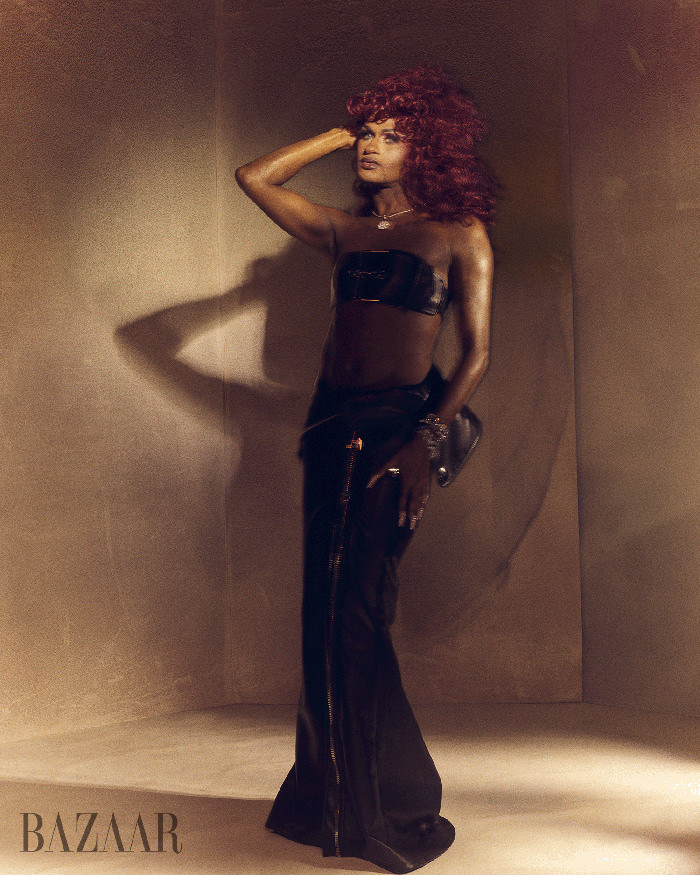
On being inspired by the first drag show he ever saw: “The first drag show I ever saw was Monét X Change in 2015 in New York City. I started going regularly, at least once a week. I thought it was so cool; I just didn’t know how to get myself in it.”
On being called “the Beyoncé of Brooklyn”: “I got hired to do my first official show back in the summer of 2019, at Metropolitan Bar in Brooklyn. I did a Rihanna mega mix, and I fell fully in love with the stage. Once you develop a brand, people come to see you because they love watching you do what you do. They call me “the Beyoncé of Brooklyn” because I do all of her live performances in my shows.
On uplifting people during performances: “As queens, we are trying so hard to entertain and to uplift others and make sure that everybody’s having a good time. There are so many instances where people have grabbed me right after my number and said, ‘I really needed to hear that song today. It reminds me that I’m a strong, powerful person.’ We’re not doing anything malicious. We’re following our dreams and doing it graciously, while putting smiles on other people’s faces.”
Sasha Velour
As told to Rosa Sanchez
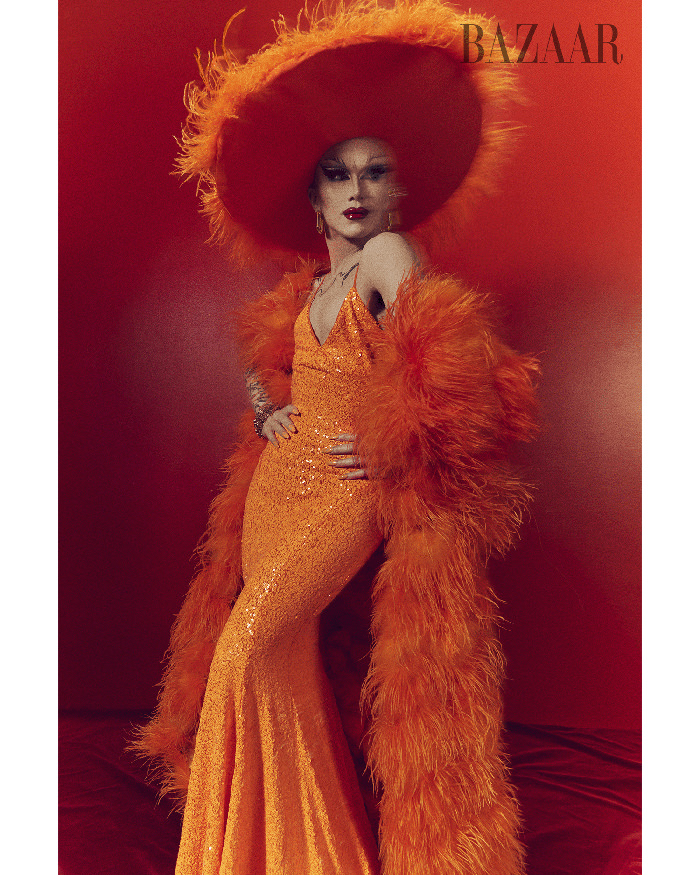
On her beyond-gender look of having no hair: “I was always drawn to the kind of alien beyond-gender look of having absolutely no hair, but the real motivating factor was that my mom lost her hair because of cancer treatment right at the time I started drag. She made some points about how much femininity is tied to having hair. And I thought, Look at your face and how gorgeous you are and the clothes you wear and the earrings. She had some interesting feminist concerns about drag, but she didn’t really understand it, which is why we have to make it part of the conversation.”
On her goals of empowering her audience to feel more comfortable in their skin: “When I started drag, I didn’t think about the audience—I just wanted to feel empowered and beautiful. Now, my motivation is what it does to people. I’ve seen people really come out of their shell by going to drag shows, not to mention doing drag themselves. And I think that’s why conservatives are scared of us. We are asking the world to change, to make room for people to be their full selves.”
On the biggest misconception about drag: “The biggest misconception about drag is this idea that it’s a mockery of gender. Even if it’s funny, it’s never a mockery. We’re paying homage to ideas of femininity. It’s about getting together to form a new love language around gender that feels welcoming and safe. And, I mean, for the people who refuse to see any gray area in in the discussion of gender, it’s very hard to understand that.”
Kevin Aviance
As told to Chelsey Sanchez
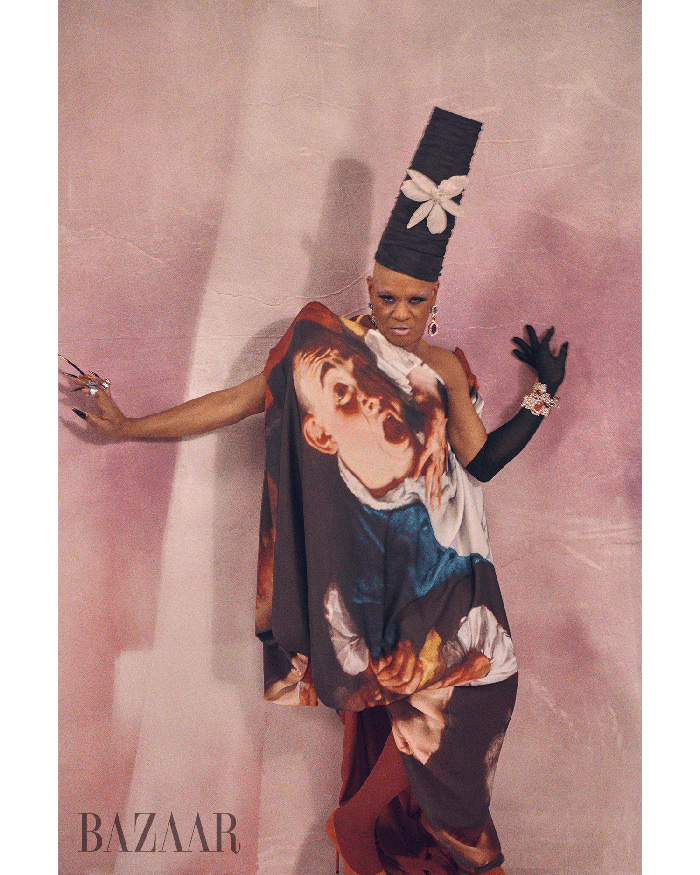
On the confidence and protection drag provides him: “Say you’re an introvert or you’re someone who can’t communicate well or someone who sits in the background. Drag has a way of giving you this armor that makes you a warrior. It makes you a sergeant in the army. When you put it on, you feel yourself come together. I feel the most protected when I am in drag.”
On perfecting his own freeing drag look: “When I started doing drag, I started with hair and breasts and tucking and all that stuff. But when I got rid of all that stuff and made my own drag? It was incredibly freeing. I mean, I was doing the he-she-them-they thing, gender bending, way before it became chic.”
On the difference between Black drag and other drag: “The difference between Black drag and other drag [is that] Black drag is political. Can you imagine being a Black drag queen now, in this day and age? You have to have some really strong bones or you’ll get shattered.”
Plastique Tiara
As told to Izzy Grinspan
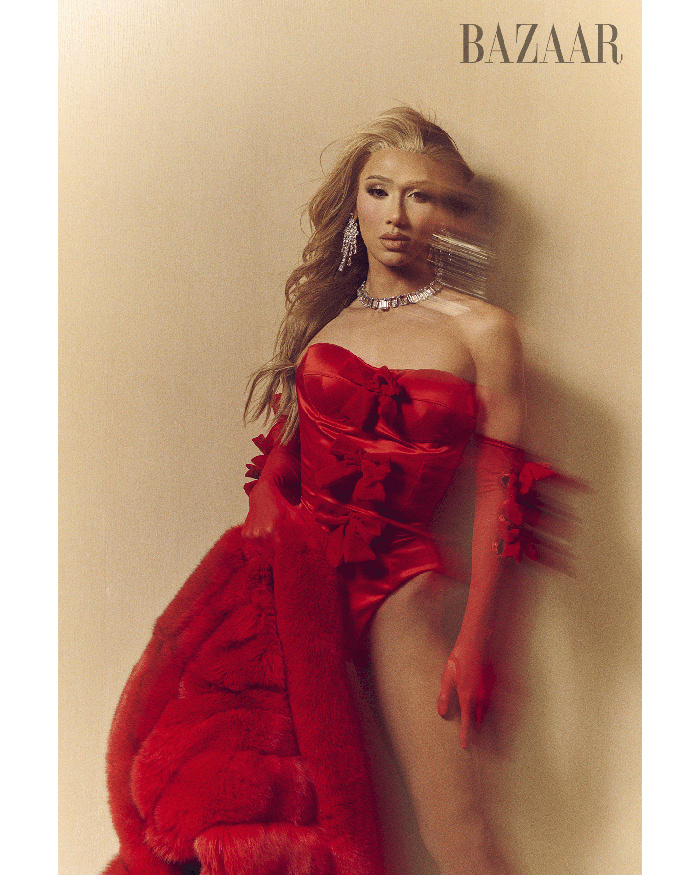
On her religious upbringing and struggle to come out: “I grew up in a very religious, heteronormative Asian family. So when I tried to come out, my parents were not very accepting. It was a breaking point for me. I was like, “Okay, am I gonna be happy, or am I just gonna be in the closet forever?” Doing drag was a way for me to kick myself out the closet, basically. I don’t know if you can be gayer than that.”
On how drag was a composite of everything she loved (hair, beauty, art, etc): “And then when I started doing drag, it changed my mind about everything I was told was wrong growing up. I was getting praise; people were seeing it as art. I went to beauty school after high school, and before I was a drag queen I was a hairstylist. And I was an art kid in high school, into photography and video, which is why I started doing TikTok. Drag was kind of just a composite of everything I loved.”
On drag queens fighting for LGBTQIA+ people: “Drag queens have always been on the front line fighting for rights for LGBTQIA+ people. I think that politicians view us as, you know, the strong soldiers. They think if they take us down, then maybe they can take everyone down. But that’s not going to be the case.”
Miss Fame
As told to Nikki Ogunnaike
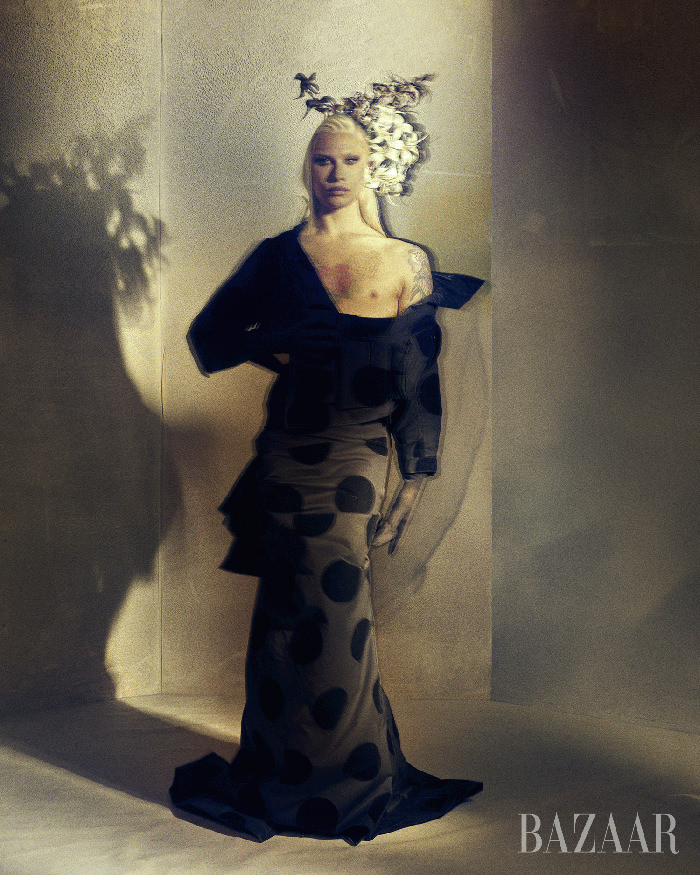
On staying true to her identity: “I’m not going to give up on my identity or my self-expression because somebody’s trying to eliminate me. When you make me uncomfortable, my voice is going to get bigger, because I’m not going to let you shrink me. Sometimes, you’re met with fire when you push back, but we have to stay firm in our truth.”
On reinforcing her worth: “If I had a little me, I’d be like, “You are amazing. You’re going to make it. You’re worthy.” That dialogue needs to be something that we learn to tell ourselves. We have to find the voice inside of us that says, “You’re good enough.” I take a lot of time to tell myself I’m worthy. And I think that our community needs to continue to tell ourselves that we’re worthy. The world is dimensional. Shouldn’t we all be mindful of that? I love different. Different makes the world pretty, makes it interesting.”
On not shrinking to make others comfortable: “I’m proud and I’m grateful that I’ve found this part of my life, that I leaned in and I didn’t let it be reduced or shrunk to make people comfortable, because that would just be a missed opportunity. We should never reduce ourselves for anyone’s opinion. We should always try to maximize ourselves and project what we are in all stratospheres of our life.”
Sasha Colby
As told to Bianca Betancourt
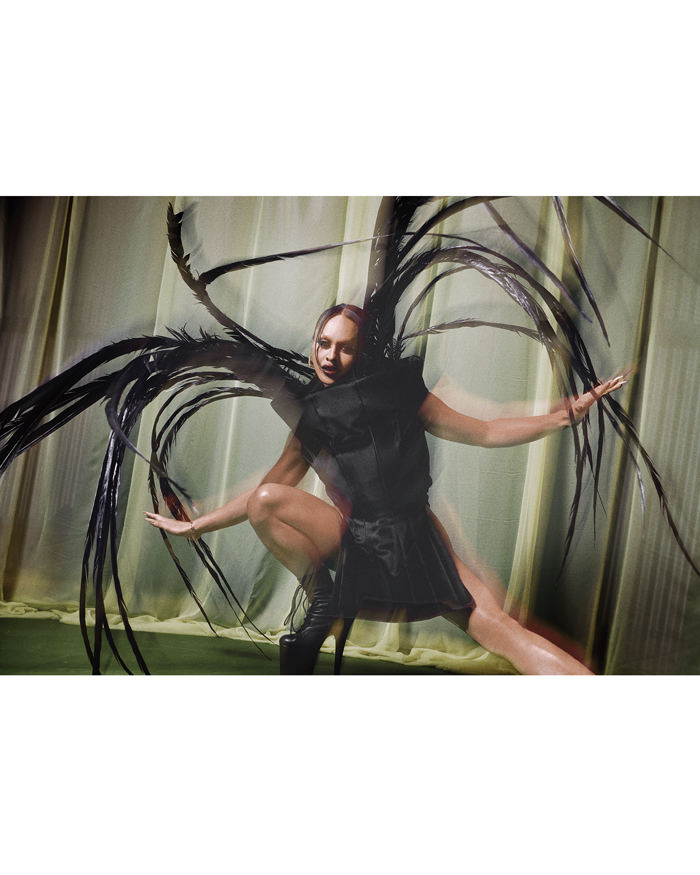
On growing up in Hawaii: “Seeing the vastness of the ocean and the depths of the rainforests in Hawaii, it makes you feel like your problems aren’t as big as you make them to be. I always try to practice the aloha spirit when I’m working or meeting new people. It’s very important to me to show the world what it’s like to be raised in Hawaii.”
On drag bringing fantasy and joy to the world: “I think drag is just something that the world needs. We need some fantasy, we need some magic, we need some queer joy to combat what’s really going on in the world. And drag will evolve however the world evolves. Drag will always push the boundaries of people’s conception of gender identity and culture in general. I love this moment that we’re living in, where so many queer people of color are coming together and being celebrated and highlighted. We’re always going to be about inclusivity and about providing magic and a safe space for people who get tossed out by society.”
On politicians dehumanizing queer people: “The anti-gay rhetoric is just insane and to me is another way of being anti-human. Politicians are trying to dehumanize queer people at every opportunity they can. To say that we are grooming people is ridiculous—we are already ostracized, and we have made our own community because of that. Because we’re nurturing and caring for ourselves, that mindset absolutely trickles down to children eventually, where they feel safe enough to be themselves. We’re allowing younger kids to be more accepting of others and of themselves—and that’s what they are really upset about.”
Serena Tea
As told to Chelsey Sanchez
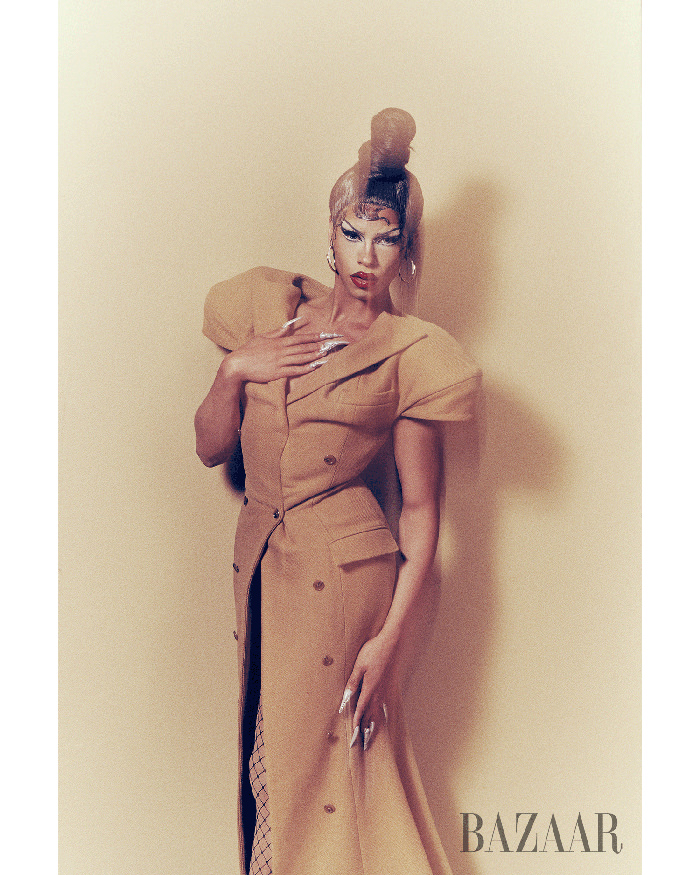
On harnessing her own power: “Drag has taught me that I’m a lot more powerful than I think I am. I’m my biggest critic. I’m very, very hard on myself. But, every now and then, I’ll catch a glimpse of myself in the mirror or see a performance video or just have someone come up to me and express how much my drag has helped them, and I’m able to remember why it is I do what I do.”
On finding a sense of self within the drag community: “I was so confused about who I was before I found [the drag community], because I didn’t really have a lot of queer people in my life. My best friend—the only other queer person I knew—passed away when we were 17, and I was really, really lost. I remember just yearning for everyone around me to be queer. And I’ve found that now. My community’s really, really beautiful.”
On being faced with ridicule: “We’ve always been faced with ridicule, and we’ve always found ways out of it, and that makes us stronger. Queer people and the LGBT community—the alphabet people, they call us—make up a really, really big part of the world. So, you’re just gonna have to get used to it.”
A version of this article will appear in the August 2023 issue of HARPER’S BAZAAR, on newsstands July 25.
[Photo Credit: Ryan McGinley for Harper’s Bazaar Magazine
GALECA Dorian TV Awards Winners Announced! Next Post:
Christina Aguilera Out and About in New York City
Please review our Community Guidelines before posting a comment. Thank you!


